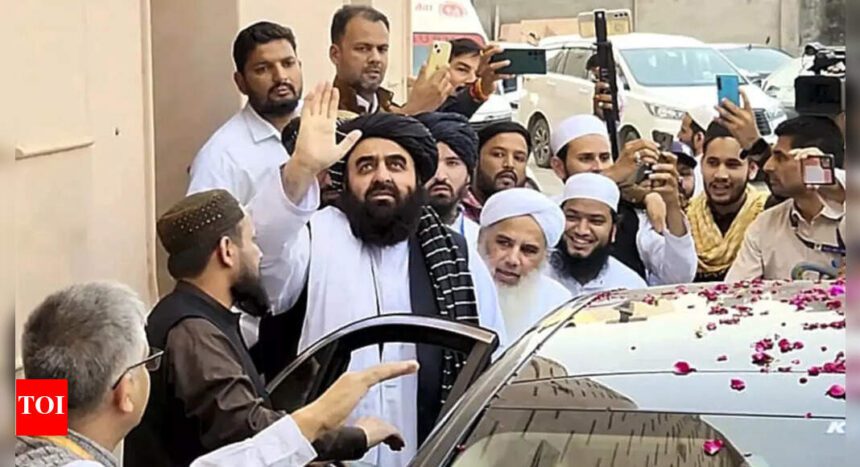Taliban Foreign Minister Visits Darul Uloom Deoband, Discusses India-Afghanistan Relations
NEW DELHI: Taliban’s Foreign Minister Amir Khan Muttaqi visited the Darul Uloom Deoband in Saharanpur on Saturday, where he met with Jamiat Ulema-e-Hind President Maulana Arshad Madani and other senior officials of the seminary.
Muttaqi expressed appreciation for the warm reception he received, voicing hope for improved relations between India and Afghanistan. “I am thankful to all of you for the warm welcome given to me by everyone in Deoband and the love showered upon me. I will pray to God that India-Afghanistan relations improve further,” he stated, as reported by the news agency ANI.
The Afghan leader underscored the importance of educational and cultural connections, indicating that the meeting focused on celebrating historical ties rather than political discussions. Maulana Arshad Madani emphasized Afghanistan’s historical involvement in India’s independence struggle, assuring that terrorists would not be allowed to use Afghan territory against India.
This visit marks a significant moment as it is the first high-level delegation from Kabul since the Taliban assumed power in 2021, occurring during a week-long trip to India by Muttaqi.
What is Darul Uloom Deoband?
Established in 1866 in present-day Uttar Pradesh, Darul Uloom Deoband is one of South Asia’s most influential Islamic seminaries. Founded by notable scholars like Maulana Muhammad Qasim Nanautawi and Maulana Rashid Muhammad Gangohi, it aims to educate Muslim youth in a rigorous interpretation of Islam, referred to as Deobandi Islam. Initially part of an anti-colonial movement, the seminary sought to revive Islam and resist British colonial rule. Over the years, Deobandi schools have proliferated throughout India, Pakistan, Afghanistan, and other regions of South Asia.
The Afghan Connection: The Spread of Deobandi Islam
While situated in India, the teachings of Darul Uloom Deoband have significantly influenced regions across the border, particularly Pakistan and Afghanistan. The Pashtun communities played a vital role in establishing Deobandi seminaries near the Afghanistan-Pakistan border. The onset of the Soviet invasion of Afghanistan in 1979 accelerated this progression; Deobandi madrassas, supported by the Pakistani government and financial aid from Saudi Arabia and the CIA, educated Afghan refugee youth who later joined the anti-Soviet resistance.
Many students from these institutions became prominent figures in the Taliban; the movement’s founder, Mullah Mohammad Omar, along with other Taliban leaders, were educated in Deobandi-influenced seminaries in Pakistan. Although the Taliban identify themselves as Deobandis, officials at the original Indian seminary note that their interpretation diverges from classical Deobandi teachings. “The Taliban say they are doing what we did in India. The way we kicked the British out of India, that’s what the Taliban are doing in Afghanistan,” Maulana Arshad Madani remarked in 2021, clarifying that there is no organizational link between the seminary and the Taliban.
Muttaqi’s visit occurs amid efforts to enhance India-Afghanistan relations, with an emphasis on increasing exchanges and collaborative efforts, including regional projects such as the Chabahar port in Iran. This visit highlights the cultural and educational dimensions of diplomacy between the two countries while recognizing the long-standing connections that link them historically and religiously.










